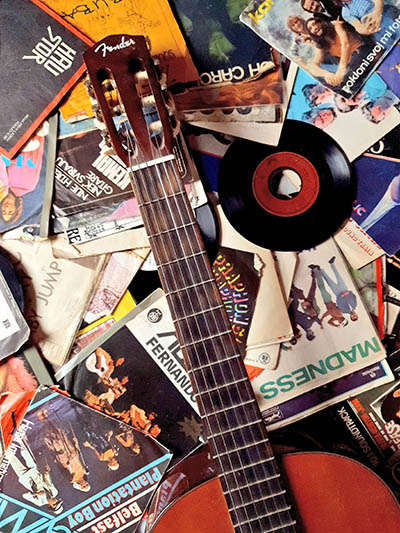Music of the spheres
Sweet music
Sweet music
Why does my heart skip a beat?
Pretty music
What makes the soul come out of me?
~ “Sweet, sweet music” The Yardbirds
Well, I guess as I started reading the recent biography of Bob Dylan that I consciously reflected on the prominence of music, not only in my time, but in the universal realm. The human brain forms around it. Is it safe to say that our DNA carries a tune? That Bruce Springsteen’s “Promise” points to important elements of life and death? That Miles Davis touches on “Sketches of Spain” in ways which, when put together, paint a country’s culture?
Music sits on my virtual mantelpiece. I pick it off whenever I need to add flavor to the food of my life. It has been one of my favorite meals since I was a youngster. The first bite came along with the strings of a cello, and to this day, I remember that my string fever came out as “Row, row, row your boat.” I even believe I might remember the fingering.

Then, false boyhood entered the picture. In the 1950s stringed instruments were for girls. Boys moved to the male dominance of brass, along with marching bands that accompanied the glory of sports. In uniforms, mimicking soldiers, we marched to the beat of whatever sport happened to be on the playing field. Football and trumpets and trombones collaborated. Drums told running backs and wide receivers how to move around opposing players. Cymbals crashed the glory of a touchdown. I was jealous of Joey, first chair trumpet, who could hit high notes without flinching.
Even war brought music to the forefront. On an aircraft carrier off the coast of North Vietnam, we sent pilots to bomb Hanoi while listening to Hanoi Hannah play our favorite American music. Aah, if only we were going to San Francisco with flowers in our hair. We knew Scott McKenzie was right in saying we would “meet some gentle people there.”
Once back from the Gulf of Tonkin, through California where I heard the Dead give a free concert in San Francisco, I headed east and settled in the “Big Apple” where one could say that it was music, me and New York meshing like a pod of peas. The Village was my home, and the musicians that congregated in the bars there, read like a gallery of those on the cusp of the 1960s whose songs and lifestyles played against what was happening in the Mekong Delta. What was even more enticing to the neighborhood was that a person could catch these people live easily, on the spur of the moment. Simply decide you wanted to see Lou Reed, Janis Joplin, the Grateful Dead, Eric von Schmidt, Ian and Sylvia, you could walk a couple of blocks to the gathering spot in which they were playing.
Music became the hub of my life. Even Woodstock became my watering hole.
As a native of Bob Dylan country in northern Minnesota and hanging around his friends Snaker, Spider and Little Sun playing blues, rags and hollers at the Triangle Bar on the “west bank” of the Mississippi in St. Paul, I felt the scene to be a central feature of my life.
My early life, followed by recording devices, helped. My father, although a physician by trade, was fond of the music of his era. As an only child, I thought Bing Crosby should not “fence me in” and that Frankie Carle, who played one of his boogies on the piano in our basement once he had tuned it correctly, was a hit-maker.
I really did not know then, however, that music would become such a central thought-provoking entity for me. As an English major in college, I found language to be either a great clarifying agent or a solace if and when dissolution attacks your life. But, then again, if that does happen, I turn to the verbalists of that genre—the Springsteens and Colin Meloys and, yes, Bob. Don’t forget that his Nobel Prize was for literature carried out through his music.
Too often Johnny is “in the basement mixing up your medicine” and I am “on the pavement thinkin’ about the government;” so, you better “look out kid, it’s somethin’ you did, God knows when but you’re doin’ it again.”
And I don’t mind saying that multiplicity brings harmony—in life and on the CD, whether that group of voices and instruments forms Union Station or The Band. Oh yes, it’s the “shape we’re in,” surrounded by the music of the spheres. The universe is vast, but harmonious.

